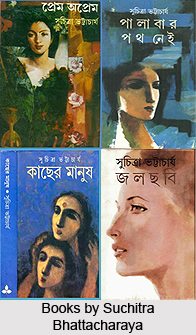 Suchitra Bhattacharya reshaped Bengali literature in Bengali modern society, where the nuclear life, communication gap between the aged and the new generation, urban culture and the female phantasmagoria society ruled by the male dominion are portrayed.
Suchitra Bhattacharya reshaped Bengali literature in Bengali modern society, where the nuclear life, communication gap between the aged and the new generation, urban culture and the female phantasmagoria society ruled by the male dominion are portrayed.
Early Life of Suchitra Bhattacharya
Suchitra Bhattacharya was born on 10th January 1950 in Bhagalpur District of Bihar. She was interested in writing from her childhood. Suchitra Bhattacharya was graduated from the Jogamaya Devi College, an affiliated undergraduate women`s college of the historic University of Calcutta, in Kolkata. After graduating from the University of Calcutta Suchitra Bhattacharya married and took a break from writing.
Career of Suchitra Bhattacharya
Suchitra Bhattacharya took up many odd jobs in her early youth and finally joined the public service which she left in 2004 to become a full-time writer. Her long career is reflected in many of her stories and novels. Suchitra Bhattacharya returned to writing with short stories written in the late seventies (1978-1979). Suchitra Bhattacharya started writing novels in the mid eighties. Within a decade, especially after publication of the novel "Kacher Dewal" (Glass Wall), she became one of the major writers of West Bengal.
Works of Suchitra Bhattacharya
The works of Suchitra Bhattacharya focuses on contemporary social issues. She was a discerning spectator of the varying urban environment and her writing closely examines the contemporary Bengali middle class society along with the lonely female mind. The crisis in human relationships and the changing values of the present era along with degeneration of the moral fibre of the modern Bengali society in the backdrop of globalization and consumerism are depicted in her prose. The exploitations and sufferings of women regardless of their social or economic identities find a distinct voice in her writing. While she was famous for her writing on women`s issues, she did not consider herself as a feminist.
Some of the works of Suchitra Bhattacharya are:
Kachher Manush (Close to Me)
 Dahan (The Burning), Kacher Dewal (The Wall of Glass)
Dahan (The Burning), Kacher Dewal (The Wall of Glass)
Hemonter Pakhi(Bird of Autumn)
Neel Ghurni
Aleek Shukh (Heavenly happiness)
Gabhir Ashukh (A Grave Illness)
Uro Megh(Flying Cloud)
Chhera Taar
Alochhaya(Shadows Of Light)
Anyo Basanto(Another Spring)
Parabas
Palabar Path Nei
Aami Raikishori
Rangin Pritibi
Jalchhobi and many others.
Translation of Suchitra Bhattacharya
The novels and short stories of Suchitra Bhattacharya have been translated into many Indian languages such as Hindi language, Tamil language, Telugu language, Malayalam language, Oriya language, Marathi language, Gujarati language, Punjabi language and English language. Suchitra Bhattacharya also wrote novels and short stories for children. Suchitra Bhattacharya has written a series of detective novels in the yearly "Anandamela" with the fictional character "Mitin mashi". Her novel "Dahan" was made into a movie by Bengali movie director, Rituparno Ghosh.
Awards Received by Suchitra Bhattacharya
Suchitra Bhattacharya received several awards which include the Bhuban Mohini Medal from Calcutta University in the year 2004, the Nanjanagudu Thirumalamba National Award from Bengaluru in 1996, the Katha Award 1997 from Delhi, the Tarashankar Award in 2000 from Kolkata, the Dwijendralal Award in 2001 from Kalyani, the Sharat Puroshkar in 2002 from Bhagalpur, as well as the Bharat Nirman Award, Sahitya Setu Award and Shailajananda Smriti Puroshkar in 2004.
Death of Suchitra Bhattacharya
Suchitra Bhattacharya died on 12 May 2015 due to a massive cardiac arrest at her home in Dhakuria, Kolkata.













